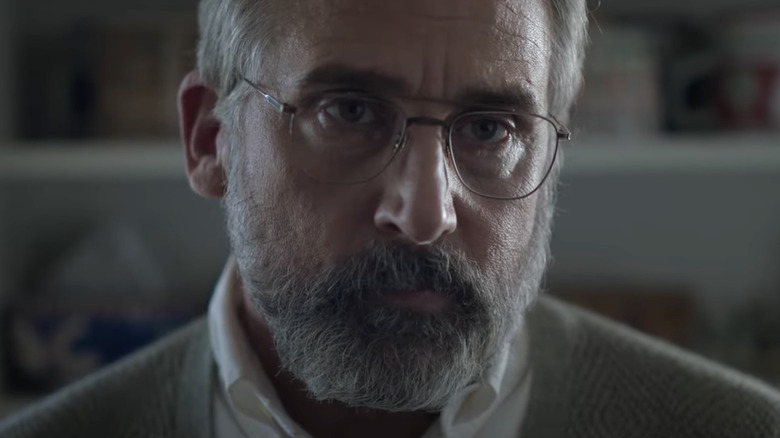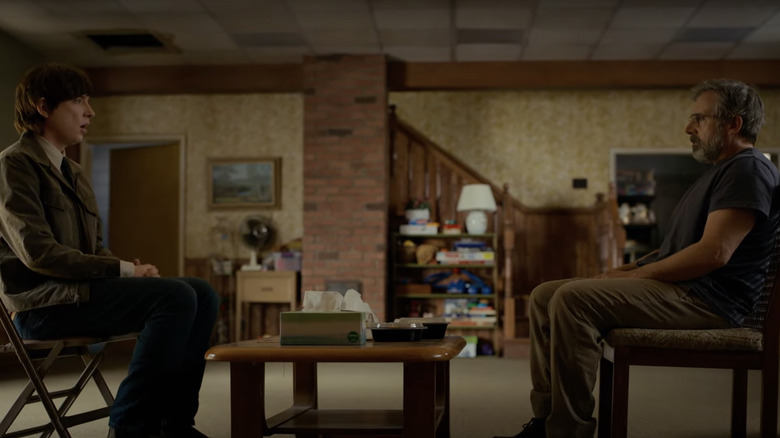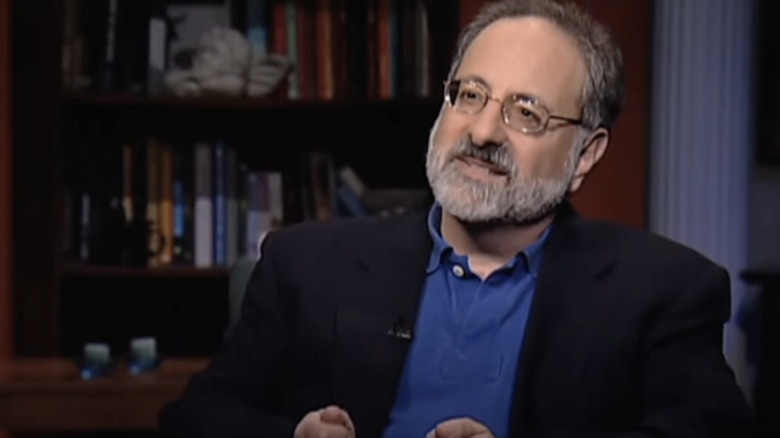The Real-Life Therapist Who Helped Bring The Patient To Life
People have long been interested in the inner workings, thoughts, and motivations of killers and sadists. This macabre curiosity has led to some truly great and twisted examples of entertainment, like "Silence of the Lambs," "Joker," and the "Saw" franchise. Although some of these examples are colorful and over-the-top, the root psychology of the characters in these movies is always one of the major draws. What does someone have to experience to have such a callous attitude toward death and suffering?
FX's "The Patient" is a far more grounded television show than the examples above, and it is an intimate look at how a killer develops through a harrowing tale of captivity. "The Patient" has a laser focus on both therapist and patient, and it stars Steve Carell and Domhnall Gleeson. Gleeson plays the role of Sam Fortner, who is a serial killer that wishes to do something proactive about his compulsion to kill and to cure his utter disregard for the lives of others. In order to curb this killer instinct, Fortner kidnaps Alan Strauss (Carell) and keeps him locked inside his house, which essentially forces Strauss to be at Fortner's beck and call. That has to be a relatively tricky situation to be in, and Fortner's explosive outbursts often cause Strauss to fear for his life. It seems, though, that the reason why the dynamic between Fortner and Strauss seems realistic is that "The Patient" showrunners had their very own in-house expert.
The series creators of The Patient brought on a seasoned psychotherapist
Speaking with Deadline, series co-creator Joel Fields was asked about how Alan Strauss was the perfect therapist, and about how the show was able to so effectively create a skillful and thoughtful therapist. Fields replied and said that he and co-creator Joe Weisberg got some help in creating the character, though Fields noted that he has had previous experience in psychological analysis.
Fields added, "If you go through enough of that [psychological analysis], you do get a feel for how it works and [the] language. But there is nothing like an expert. And Dennis Palumbo was ours. He's a therapist with many years of experience and was able to sort of reframe things and give us approaches to things from a therapist's point of view, that even as a patient with many years of therapy, would never quite come up. So that was incredibly helpful."
This approach by both Fields and Weisberg makes Carell's Strauss an incredibly sympathetic figure that is able to mitigate some of the more lethal instincts of Gleeson's Fortner, and the limited series has certainly garnered a fair amount of attention for both of their performances. "The Patient" is currently holding an 85% critical score on Rotten Tomatoes, which notes that the two lead actors carry the show. At least fans of "The Patient" now know why the character of Strauss is so understanding — the character's responses have been vetted by a skilled real-life therapist.
Palumbo is also a fiction author and has been active in Hollywood for decades
According to Dennis Palumbo's website, the psychotherapist is also an accomplished author who has written several mystery books like "Mirror Image," "Fever Dream," and "Panic Attack." Besides writing fictional stories, Palumbo has also used his talents as a screenwriter, and he spent time as a staff writer for "Welcome Back, Kotter." As a licensed psychotherapist, Palumbo typically helps people with creative issues, which probably helped "The Patient" creators craft such a stirring show.
In a 2006 interview with NPR, Palumbo discussed how at the time many male therapists were often villains in pop culture, and gave examples like "Final Analysis, "Color of Night," "Hide and Seek," and "Law & Order." He then added, "Let's face it. The world's a pretty treacherous, confusing place, nowadays. Our most sturdy institutions — government, the Church, education — traditionally headed by men seemed to be letting us down. It's no different with therapy. Nowadays, much like priests, male therapists suffer from the failed expectations of a disillusioned public. Our distrust and suspicion buffed to a stereotypic finish by the narrative demands of TV and film."
However, it seems as if Palumbo has taken a more active role in combating this growing stereotype since that interview, and due to his efforts in "The Patient," Steve Carell's character definitely didn't embody any of the negative traits that Palumbo found distracting and unhelpful. Still, it seems like the production of "The Patient" was greatly enhanced by Palumbo's acumen, presence, and tremendous knowledge base.


